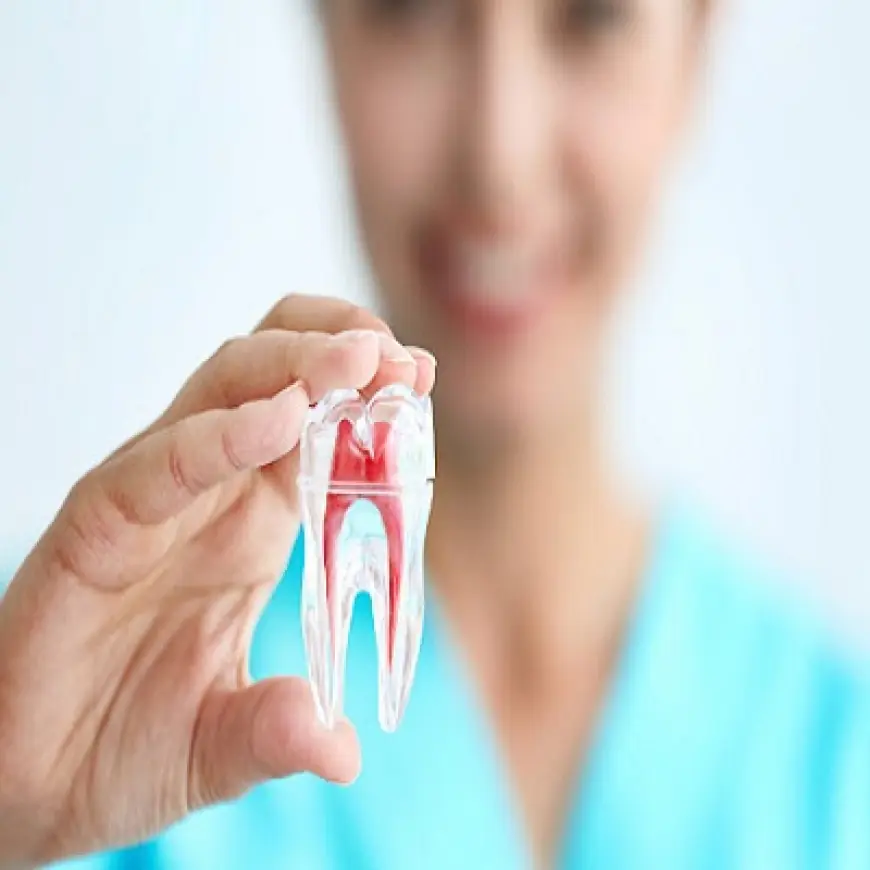Common Complications After a Root Canal and How to Prevent Them
Root canal treatment in Islamabad is a highly effective dental procedure designed to save an infected or damaged tooth.

Root canal treatment in Islamabad is a highly effective dental procedure designed to save an infected or damaged tooth. However, like any medical procedure, it may sometimes lead to complications if not performed correctly or if aftercare is neglected. While most root canals are successful, understanding potential complications and how to prevent them can help ensure a smooth recovery.
In this blog, we’ll explore common post-root canal complications, their causes, and practical ways to prevent them.
Common Complications After a Root Canal
1. Pain and Sensitivity
Why it happens:
- Mild pain and sensitivity are normal after a root canal as the tooth and surrounding tissues heal.
- In some cases, severe or prolonged pain may indicate an issue such as incomplete cleaning of the infection or nerve irritation.
Prevention & Management:
✅ Take over-the-counter pain relievers like ibuprofen (if recommended by your dentist).
✅ Avoid chewing on the treated tooth until the final restoration (crown) is placed.
✅ If pain persists beyond a few days to a week, consult your dentist.
2. Swelling and Inflammation
Why it happens:
- Swelling around the gums or jaw may occur due to infection, tissue irritation, or an allergic reaction to materials used.
Prevention & Management:
✅ Apply a cold compress to the affected area to reduce swelling.
✅ Maintain good oral hygiene to prevent bacterial buildup.
✅ If swelling is accompanied by severe pain or fever, contact your dentist immediately.
3. Infection or Abscess Formation
Why it happens:
- If bacteria remain inside the tooth after the procedure, an infection may develop.
- A cracked or poorly sealed tooth can also allow bacteria to re-enter.
Prevention & Management:
✅ Ensure the root canal is performed by an experienced dentist or endodontist.
✅ Take prescribed antibiotics if recommended by your dentist.
✅ Return for follow-up visits to monitor healing.
4. Incomplete Cleaning of Root Canals
Why it happens:
- Some teeth (especially molars) have complex root canal structures, making them difficult to clean completely.
- If infected pulp is not fully removed, pain and reinfection may occur.
Prevention & Management:
✅ Visit a specialist endodontist for complex cases.
✅ If pain persists for weeks or months, your dentist may recommend retreatment or an apicoectomy (removing the tip of the root).
5. Tooth Fracture or Breakage
Why it happens:
- A root canal removes the pulp, making the tooth more brittle and prone to fractures.
- Failing to get a crown or filling increases the risk of the tooth breaking.
Prevention & Management:
✅ Get a dental crown as soon as possible after the root canal, especially for molars and premolars.
✅ Avoid chewing hard foods (nuts, ice, hard candy) on the treated tooth.
6. Loose or Dislodged Filling/Crown
Why it happens:
- The temporary filling placed after a root canal can wear down or fall out if not properly protected.
- Poorly fitted crowns may become loose over time.
Prevention & Management:
✅ Avoid chewing hard or sticky foods before getting a permanent crown.
✅ If your filling or crown feels loose, visit your dentist immediately to prevent reinfection.
7. Numbness or Nerve Damage
Why it happens:
- In rare cases, the nerves near the tooth may be damaged due to:
- Over-instrumentation during the procedure.
- Swelling that puts pressure on surrounding nerves.
Prevention & Management:
✅ Choose a skilled and experienced dentist to minimize risks.
✅ If numbness persists for weeks, inform your dentist immediately.
8. Darkening or Discoloration of the Tooth
Why it happens:
- After a root canal, the treated tooth may appear gray or darker due to the absence of living tissue inside.
Prevention & Management:
✅ Discuss cosmetic options with your dentist, such as:
- Teeth whitening for minor discoloration.
- Dental veneers or crowns for severe cases.
9. Sinus Issues (For Upper Teeth)
Why it happens:
- Root canal treatment on upper molars or premolars may sometimes irritate the sinuses, leading to sinus pain, congestion, or pressure.
Prevention & Management:
✅ If symptoms last more than a few days, see your dentist.
✅ Avoid forceful sneezing or nose-blowing immediately after the procedure.
How to Prevent Root Canal Complications
1️⃣ Choose a Qualified Dentist or Endodontist
- A specialist endodontist has advanced training in root canal procedures and can handle complex cases.
2️⃣ Follow Post-Treatment Instructions Carefully
- Take prescribed medications (painkillers or antibiotics) as directed.
- Avoid eating hard foods until the final restoration is placed.
3️⃣ Get a Crown if Recommended
- A crown provides strength and protection for the treated tooth.
- Discuss different crown materials with your dentist to choose the best option.
4️⃣ Maintain Good Oral Hygiene
- Brush twice a day with a soft-bristled toothbrush.
- Floss gently to prevent bacteria buildup.
- Use an antibacterial mouthwash to reduce infection risk.
5️⃣ Schedule Follow-Up Appointments
- Regular dental visits help detect early signs of complications.
- If you experience persistent pain or swelling, consult your dentist immediately.
6️⃣ Avoid Bad Habits That Can Damage the Tooth
- Do not bite on hard objects (ice, pens, fingernails).
- If you grind your teeth at night, consider wearing a mouthguard.
Conclusion
A successful root canal can save your natural tooth and restore your oral health. However, complications can arise if the procedure is not performed properly or if aftercare is neglected. By understanding these risks and following preventive measures, you can ensure a smooth recovery and enjoy a pain-free, healthy smile.












